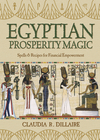An Interview with Claudia R. Dillaire
Many of the New Age books on the market do not touch on Egyptian magic. Yet, the Sumerians and Egyptians were "practicing" magic throughout their entire histories; it was a part of everyday life for them. Modern Wicca and Paganism are direct descendants of those magical practices, so I wanted to make Egyptian magic a viable option for practice today. Plus, the ancient Egyptians left behind a wealth of written works, while many other Pagan cultures have left us with only speculation on how they practiced their rituals.
2. How would you describe your magical background? Have you always focused on Egyptian traditions, or have you studied others as well?
I dabbled a bit with "The Occult," as it was called, when I was in my teens. I feel I was drawn to magic, having been born on Halloween. When I approached magic again, I looked at a number of traditions and paths, but none really touched me. Instead, I started focusing on mythology, which is how I discovered Egyptian magic. Their beliefs and traditions make sense to me, even though their needs were quite different from mine. Now, I am studying other ancient civilizations, Hittites, Sumerians, Babylonians, even the ancient Hebrews, who were pagans in the beginning.
3. You’ve written other books about Egyptian magic, including revenge spells and love spells. What differentiates Egyptian spells from more modern spells, or those from other ancient traditions?
The spells I write, while staying true to the essence of the ancients, are in many ways quite tame. The ancient Egyptian spells were often written as threats and curses to the gods, which many practitioners may find disconcerting. Additionally, ancient magical practices did not shy away from destructive and coercive magic. It was as much a part of everyday life as constructive magic. Having written a book on revenge magic, I myself do not shy away from the darker aspects, because dark magic is not to be feared; it can be harnessed and used for many intentions, especially protection. I know that Wicca stresses "Harm none," and "The Law of Threefold Return," possibly in an effort to make pagan beliefs seem less threatening. But, all ancient cultures practiced dark magic, fully expecting to find peace in the afterlife. The practice of dark magic would not prevent them from joining with their gods after death.
4. During our current economic times (and at all times, really), most of us would like a little more prosperity. How do you define prosperity? Is it simply along financial lines?
In our society, we equate prosperity with wealth, power, or the newest electronic gadgets, but in the end, it is all just stuff. Aside from money and possessions, prosperity to me means "how rich a person you are," by giving your time and energy to charity work, helping a neighbor with groceries, any type of good deeds. Don’t get me wrong, I’m like everyone else and would love to have enough money to live comfortably and have a cushion to draw upon in lean times. But, how many of us really have that? I struggle to make ends meet, but the struggle itself only helps me to strive to accomplish more.
How can we begin to invite a little more prosperity into our lives?
We are so wrapped up in the here and now; everything is too easy to obtain instantly, that no one really works toward anything. Many things are just common sense: make lattes at home; buy generic in place of name brands; take a lunch to work. And, it is also important to change your thinking. I sound like the eternal optimist, but having a sour outlook really affects your ability to attract prosperity. Think positive, even when it hurts.
5. What advice do you give for those looking for prosperity, however we may personally define it?
Start with the common sense and downsize your expenditures. When looking for employment, think outside the normal channels. Try something new, take an internship to get your foot in the door, or work as a volunteer, if you can afford to )it could lead to a paying position down the road). Magically, change your outlook to a positive one; invite that prosperity in. And, never stop striving. Sometimes, the best achievements and the most precious possessions are those we have had to work for.
